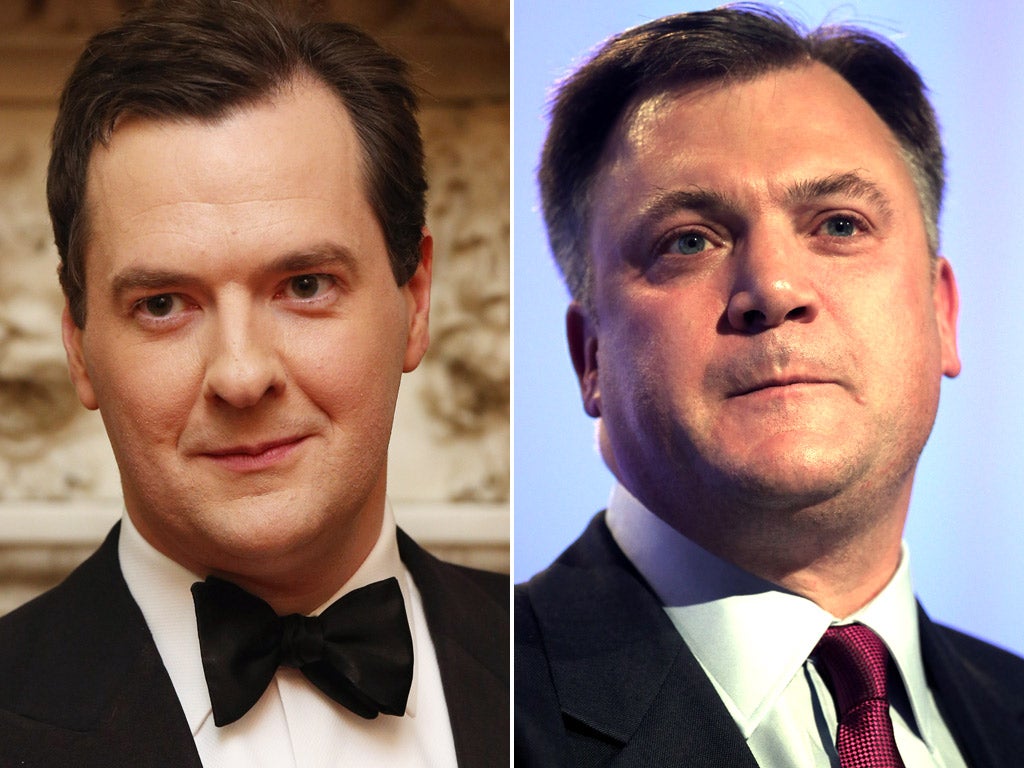Spending Review: Whoever wins 2015 general election faces more economic pain
Experts warn that all parties will make deeper cuts after election as the only way to tackle the deficit

The £11.5bn of public spending cuts in 2015-16 to be announced by George Osborne today will be followed by more cuts and tax rises in future years, experts have warned.
Privately, senior figures in the three main political parties admitted there would be a lot more “pain” to come, whoever wins the 2015 general election. They acknowledged that the Chancellor's government-wide spending review would be only a staging post on the road to clearing the deficit.
The Coalition needs to set departmental budgets for 2015-16 because that financial year will start a month before the 2015 election. Budgets for the rest of the five-year parliament will have to be addressed by the next government. “The real spending review will happen then,” one minister admitted.
Tomorrow Mr Osborne will hint at the challenge ahead by speaking about his long-term plans to keep a lid on the welfare budget, which could mean cutting pensioners' perks such as the winter fuel allowance after the election and raising the age at which people draw the basic state pension.
Policy Exchange, the centre-right think tank, warned in a report that future governments would have to find £40bn of cuts if spending on the state pension is not capped. Author Matthew Oakley, a former Treasury official, said Mr Osborne must cap the half of government spending that falls outside Whitehall departments' control - the £379bn a year spent mainly on benefits, tax credits and debt interest payments. “It [the cap] has to include the full range of benefits, including pensioner benefits and the state pension,” said Mr Oakley. “Without this, any proposed cap would be meaningless and fail to recognise the real drivers of rising costs. It's time for an honest conversation with the public.”
Gavin Kelly, chief executive of the Resolution Foundation, which calculates that a further £26bn of cuts will be needed by 2018, said: “The cuts in this spending review are just the next phase of an on-going process - there's a lot more fiscal pain to come in the years to 2018. Whoever wins the 2015 election will face deeply unpalatable choices over public finances including tax rises, yet deeper spending cuts or extending the timetable for deficit reduction.”
He added: “If the current timetable is pursued, and existing areas of spending protection continued, then the implications for those areas which aren't ring-fenced looks pretty implausible. The already bracing pace of departmental cuts would have to accelerate after 2015 if something else doesn't give.”
Alex Henderson, tax partner at PwC, said £40bn of cuts could be needed in the two years after 2015-16. “The temptation to change the plans slightly and raise more tax will be great,” he said.
Today Mr Osborne confirmed he would maintain the ring-fencing around the NHS and schools budgets in today's statement. However, other parts of the education budget could be squeezed by £1bn, including further education and the administrative costs of setting up academies and free schools.
The Chancellor told the Commons said his review would set out “the next phase of the economic plan to move Britain from rescue to recovery.” He added: “I will be offering real protection for our National Health Service and to our schools. These are vital public services, they are an investment in our economic future and they are all about doing what we need to do to win that economic race.”
Danny Alexander, the Chief Treasury Secretary, hinted the Government may speed up the introduction of “community budgets” under which public sector services share operations, after accountants Ernst & Young estimated that between £9bn and £20bn could be saved over five years.
Join our commenting forum
Join thought-provoking conversations, follow other Independent readers and see their replies
Comments